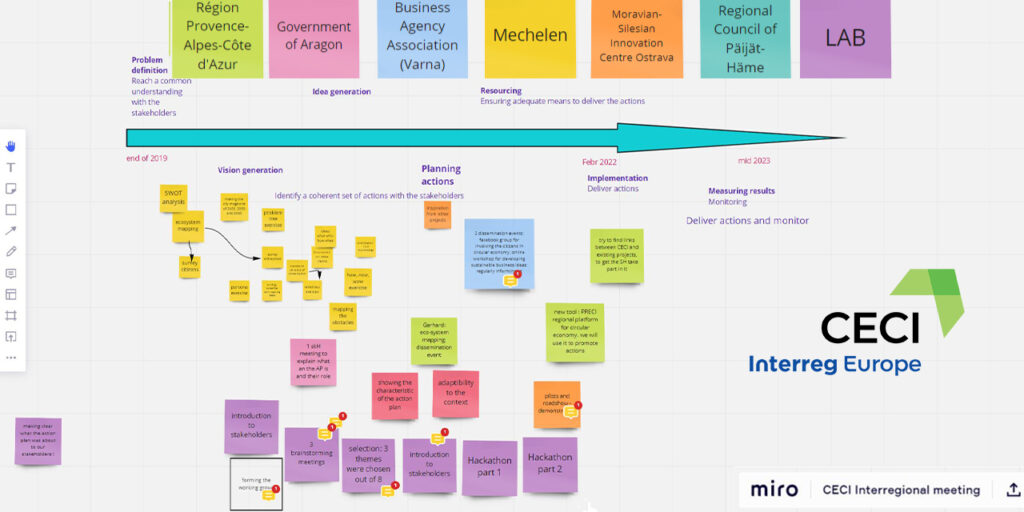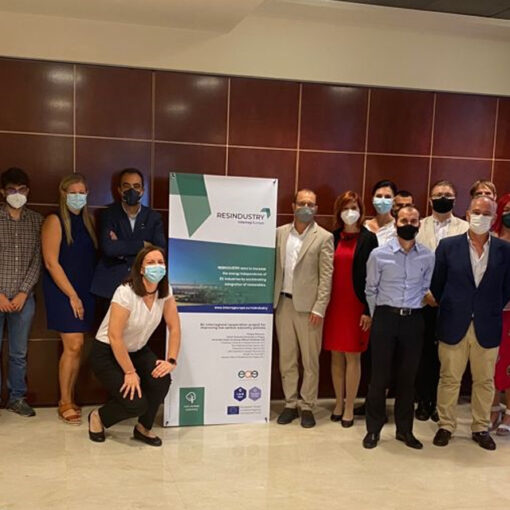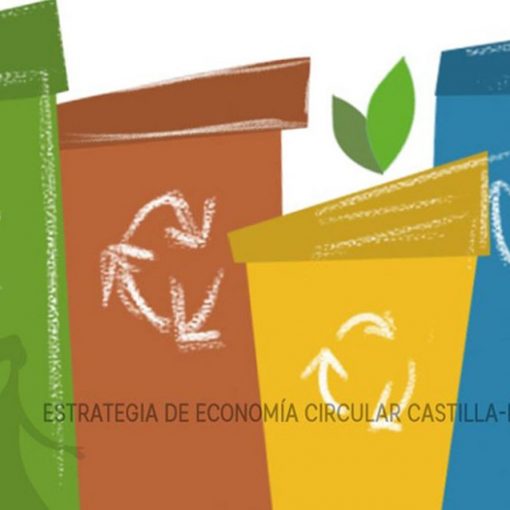Stakeholder participation in knowledge exchange and production plays an important role and brings significant benefit. Forming local stakeholder groups has been essential also in the CECI – Citizen Involvement in Circular Economy Implementation project. CECI is an Interreg Europe co-funded project that connects eight partners from Finland, France, Czech Republic, Spain, Bulgaria, and Belgium to improve related regional circular economy policies emphasizing the role of citizens. The main project outcome is to design supportive regional action plans based on interregional knowledge and good practices exchange.

Experiencing Online Engaging Collaboration
Online collaborative platforms bring people to work together while not being necessary physically present in one room. For instance, the Miro whiteboard enables engaging collaboration in real-time, anytime and anywhere.
During the CECI 3rd interregional event, a workshop on new approaches to citizen involvement was organized. Each region was assigned its own colour of Post-it Notes. The event host explained the basic functions of the tool, followed by a prepared agenda and questions. First, all regions indicated the state of the action plan development above the timeline placed on the endless whiteboard (Picture 2). Each project region was at a different stage of development. Therefore, sharing information and learning from each other may be very beneficial and enriching. Then, the methodologies and actions used in involving stakeholders during the action plan process were discussed in groups and listed. Each region briefly highlighted the methodologies. Further tips on engaging stakeholders were shared. Also, a self-evaluation tool on stakeholder engagement was completed and followed by plenary reflection.
Action Plan Process in Finland

LAB University of Applied Sciences is quite advanced in the process, as indicated on the timeline far top right in purple colour (Picture 2). The process started by introducing the action plan concept and its purpose to the regional stakeholder group. Then, a dedicated action plan working group was formed with six committed stakeholders and CECI project partners from LAB and the Regional Council of Päijät-Häme. Three brainstorming working group meetings were arranged and good practices on citizen involvement in circular economy from other partners were explored. The group discussed the feasibility of these practices and possible similarities with already existing practices in the region. Altogether eight themes were identified, out of which three themes were then selected by voting: sustainable mobility, living, and textiles. The three main themes were further explored and then presented to the whole local stakeholder group, including the inspiring CECI good practices.
To further develop the selected themes and bring about new ideas, a two-day hackathon on sharing economy was organized with a wide range of stakeholders. The participants worked on new business models and service concepts for sharing economy. Demos Helsinki, a consulting company that facilitated the hackathon, summarized the outcomes after the event. The valuable ideas will further be evaluated by the CECI team and some of them may even be implemented. The action plan process will further continue and concretize.
Author
Katerina Medkova works as an RDI Specialist at LAB University of Applied Sciences and is CECI Communication Manager. CECI – Citizen Involvement in Circular Economy Implementation is an Interreg Europe co-funded project led by LAB University of Applied Sciences, Finland.
Links
Link 1. Interreg Europe. 2021a. Project Summary. CECI. [Cited 9 Aug 2021]. Available at: https://www.interregeurope.eu/ceci/
Link 2. Interreg Europe. 2021b. Project Good Practices. CECI. [Cited 9 Aug 2021]. Available at: https://www.interregeurope.eu/ceci/good-practices/
Link 3. Miro. 2021. The online whiteboard for easy collaboration. [Cited 9 Aug 2021]. Available at: https://miro.com/
Link 4. Interreg Europe. 2021c. CECI Press Release. CECI. [Cited 9 Aug 2021]. Available at: https://www.interregeurope.eu/ceci/news/news-article/12170/ceci-press-release/
Pictures
Picture 1. Fauxels. 2019. 3184418. Pexels. [Cited 9 Aug 2021]. Available at: https://www.pexels.com/fi-fi/kuva/kadet-ihmiset-lappari-business-3184418/




